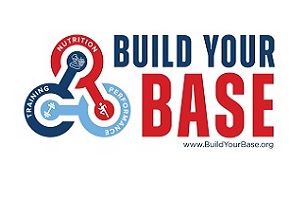Shawn Crawford
(Special to National Scholastic Sports Foundation.)
"This is cool, this is nice," said Shawn Crawford.
For this moment in time - the evening before the Nike Indoor Nationals opened with a spree of sensational perrformances in Landover, Maryland, last March - the Olympic 200-meter king was just one rapt listener at guest lecturer Dan Fichter's ear-and-eye-opening demo-lecture on the hottest topic of the weekend: "I'm fast enough to be here; how do I get even faster?"
Speed, endurance and technique were on the agenda for the evening's series of "Learn From The Olympians" sessions.
Olympic hurdles champion Joanna Hayes, Olympic triple jumper Tiombe Hurd and Olympic 1500-meter man Alan Webb provided proof positive of all the secrets coaches Andrew Blanks, Carmen Jackson and Scott Raczko were readily revealing to their audiences of young athletes.
But the principal points Fichter kept driving home really reverberated around the Prince George's County Sports and Learning Center.
"Think outside the box," Fichter urged, stressing the great misconceptions he's seen too many coaches and too many sprinters accept as gospel.
"Volume control" was one of them, the errant one-size-fits-all notion utilized by numerous coaches assuming their freshmen and seniors can handle the same number of intervals on the track and reps in the weight room.
"Optimal form" was another. "What works for one sprinter may not work for another sprinter," Fichter stressed. "If you indeed want to become an elite athlete, you need to know what works for you and what doesn't.
"You need to know what's going to fly and what's not."
And if you just don't know, "just ask."
Perfect example: The upright carriage Michael Johnson maintained though his unparalleled career of racing to medals and glory. It worked sensationally for M.J. It simply "doesn't fly" for most others.
Johnson collected his final gold medal anchoring USA to the 4x400 relay crown at the 2000 Sydney Games.
By 2004 and Athens, it was time for America's latest crop of amazing young talent - Crawford high on the list - to step forward.
Crawford's first ventures into track came as a seventh-grader in junior high school. "I didn't even know this sport existed until then," he said.
He went on to become a three-time state champion in the sprints for Indian Land High School of Fort Mill, SC , then an 11-time NCAA All-American at Clemson before racing to his sport's loftiest heights.
He'd gained a degree of fame in 2003 by running against a zebra and a giraffe on the "Man vs. Beast" TV program, but was all-business thereafter.
Crawford took the gold medal in the Athens 200 meters, blazing the half-lap in 19.79 seconds, third best winning time in Olympic annals, topped only by Johnson's 19.32 at Atlanta in 1996 and Joe DeLoach's 19.75 at Seoul in 1988, and powering an American sweep with Bernard Williams second and Justin Gatlin third.
He earned a silver in the 4x100 relay, as shaky USA baton work opened the door to a British victory.
And he landed a close fourth in the 100, a race won by Gatlin in 9.85.
His 2005 season was something of a downer, slowed by the bunion-caused inflamation of the nerves and tendons around the metatarsals of both feets. He laughs now that "if I'd only known to go out and purchase $2.99 metarsal pads and insert them in my sneakers and spikes, it might have made all the difference."
But that's behind him now. Crawford is back running at full tilt in 2006. While Gatlin and Asafa Powell have been hogging the sprint headlines with their record races over the 100 route, it's Crawford who still considers himself king of the 200-meter realm.
"My job here is to inspire some young athletes to do what I was fortunate enough to be able to do," he said in Landover.
"I have a lot to give back. If someone has a dream, all they need is someone to help ignite that, and I hope I can do that for some of the young people here."
Many "cool" things happened to Crawford after his return from Athens.
He made guest appearances on the Jay Leno and Dennis Miller shows, and many more. He was a celebrity invitee to the Macy's Thanksgiving Day Parade in New York. He was a gold-medal spokesman for the NYC 2012 Olympic bid.
"So many things happened, I can't even remember," he said.
"I now know that when you go out and win a medal for your country, when you come back you have the respect of all the people. When you gain a great honor like an Olympic gold medal, it makes everybody feel good."
Crawford, who trains with Gatlin in Raleigh, N.C., owns a career-best of 9.88 in the 100 to go along with that 2004 19.79 in the 200. Look for Crawford to do big things in the upcoming USA Nationals (June 21-25 in Indianapolis) and then onto the Golden League season and other Grand Prix events in Europe.
"My whole focus, every year, is to come out and try to break world records," he said. And when his own world-class running days are over, he'd like nothing better than to "put something back" into track and field by coaching young runners.
"I like to help people and I like to see the results of what I'd be doing," he said. "I'd be living vicariously through them. "Yes, I really want to do it. I think of this all the time.
"It would be a very cool thing to do."




